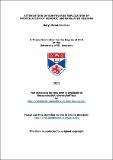Attenuation of bunyavirus replication by modification of genomic untranslated regions
Abstract
Bunyamwera orthobunyavirus (BUNV) is the prototype for the family Bunyaviridae.
BUNV has a tripartite RNA genome of negative polarity composed of the large(L),medium (M)and small(S)segments. Each segment contains an open reading frame (ORF) flanked by untranslated regions (UTRs). The eleven terminal nucleotides are conserved between the three segments while the internal regions are unique. The UTRs play an important role in the virus life cycle by promoting transcription, replication and encapsidation of the viral genome.The work presented in this thesis explores UTRs plasticity and examines ways to engineere attenuated viruses by modifying only their UTRs. Using reverse genetics, mainly two ways of attenuation were explored: rescue of viruses either carrying deletions within their 3’ and/or 5’ UTRs in all three segments, or of viruses carrying one segment bearing heterologous UTRs. Both approaches resulted in virus attenuation in tissue culture, with viruses producing smaller plaques or even no plaques, and growing to lower titres than wild-type BUNV. Through serial passage, viruses were shown to
regain some level of fitness while the mutations introduced in the UTRs proved to be stable. Thus, to investigate the mechanism behind fitness recovery, the nucleotide sequence of the entire genome of viruses with deletions in their UTRs was determined. Amino acid changes were observed in the viral polymerase (L protein) of most mutant viruses and the vast majority of the amino acid changes occured in the C-terminal region. The function of this domain is unclear to date, however data obtained using a mini-replicon assay suggest that the
C-terminal domain of the L protein might be involved in UTR recognition. Full genome
sequencing also allowed the identification of an amino acid mutation within the polymerase that resulted in a temperature sensitive phenotype when introduced in an otherwise wild-type BUNV. Thus, it was shown that mutations introduced within the UTR regions of the genome were stable through serial passage and resulted in attenuation. Such a strategy could be used in
combination with mutations of the ORF to design live-attenuated vaccines against serious pathogens within the family Bunyaviridae.
Type
Thesis, PhD Doctor of Philosophy
Items in the St Andrews Research Repository are protected by copyright, with all rights reserved, unless otherwise indicated.

